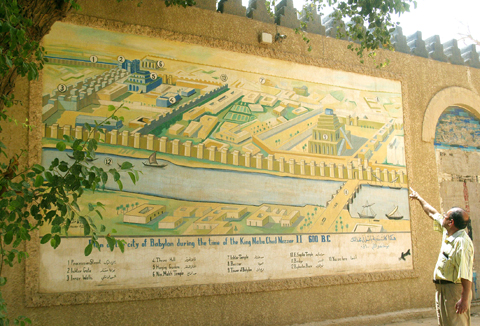The last outsiders to visit the ruins of the once-mighty city of Babylon in Iraq came in tanks and helicopters, leaving a blight on its historic and fragile landscape, archeologists say.
The city, born on the banks of the Euphrates River 5,000 years ago and full of priceless archeological treasures, was transformed into a US military camp after the 2003 invasion with a heliport built among the ruins.
The base was later passed to Polish army control and despite the soldiers’ departure in 2005, the damage left behind is evident. At a meeting in Berlin next month, Iraqi and other specialists will endeavor to assess the true level of damage.

PHOTO: AFP
Iraqi archeologist Hadi Mussa Qataa, who guided a reporter through the fragile ruins, said helicopter take-offs and landings, along with the tremors from the heavy rumble of armored vehicles had damaged the city’s historic monuments.
Babylon is located in the famed Fertile Crescent between the Euphrates and its sister river, the Tigris, some 85km southeast of the Iraqi capital Baghdad.
When US-led troops invaded Iraq to topple Saddam Hussein, all that was visible of the ancient city was a collection of mud-brick buildings and debris together with new restoration projects commissioned by the Iraqi strongman.
Saddam was keen to stamp his mark on the site, also home to the Hanging Gardens, one of the Seven Wonders of the Ancient World, and commissioned a huge range of restoration projects starting in the 1980s.
Thousands of Sudanese workers were brought to the site to build monuments on top of the priceless ruins, using bricks bearing Saddam’s name, in an echo of the practice of the ancient Babylonian kings.
“Restoration of the palace of King Nebuchadnezzar under the glorious reign of Saddam Hussein,” the tributes read.
Damage done to archeological artifacts during the restoration work was made worse when US forces set up the 150-hectare base at the site in April 2003, the same month Saddam was overthrown.
Military digging involving soil containing materials of archeological significance, the construction of the heliport and the seepage of fuel into the soil, all sparked concerns over the condition of the site.
The US military does not deny that damage occurred at some archeological sites between 2003 and 2004 but since then, troops have “moved facilities away from many other important archeological sites,” a military spokesman said by email.
A report by UNESCO described the damage caused during the military occupation of the site as “very serious.”
Already the famous blue bricks that form the lions, bulls and dragons making up the decorations around the Gate of Ishtar, the Babylonian goddess of love, have been found to have been damaged.
The original gate, on display at the Pergamon Museum in Berlin, marked the entrance to the palace, temples and domestic dwellings of the city. These buildings were fashioned out of mud bricks which still bear Babylonian and Assyrian markings.
At least 32,000 items were pillaged from the 12,000 archeological locations across Iraq during widespread looting following the invasion. The US military denies involvement in any of the thefts of historical artifacts.
After the Poles left the camp, Babylon was handed over to the Iraqi Antiquities Authority but excavation work and restoration projects have both ground to a halt.
Today, a dirt track, several coils of barbed wire and a few sandbags are the only evidence to show that the ruins were used as a military base.
Leading archeologists fearing for the physical safety of Babylon’s remaining archeological treasures, have launched efforts to protect the site from further damage and resume archeological research.
They are pushing for Babylon to be included on a list of protected World Heritage sites. This would mean excavations could be relaunched and archeologists from around the world would once more have a chance to probe Babylon’s rich history.

BLOODSHED: North Koreans take extreme measures to avoid being taken prisoner and sometimes execute their own forces, Ukrainian President Volodymyr Zelenskiy said Ukrainian President Volodymyr Zelenskiy on Saturday said that Russian and North Korean forces sustained heavy losses in fighting in Russia’s southern Kursk region. Ukrainian and Western assessments say that about 11,000 North Korean troops are deployed in the Kursk region, where Ukrainian forces occupy swathes of territory after staging a mass cross-border incursion in August last year. In his nightly video address, Zelenskiy quoted a report from Ukrainian Commander-in-Chief Oleksandr Syrskyi as saying that the battles had taken place near the village of Makhnovka, not far from the Ukrainian border. “In battles yesterday and today near just one village, Makhnovka,

US Secretary of the Treasury Janet Yellen on Monday met virtually with Chinese Vice Premier He Lifeng (何立峰) and raised concerns about “malicious cyber activity” carried out by Chinese state-sponsored actors, the US Department of the Treasury said in a statement. The department last month reported that an unspecified number of its computers had been compromised by Chinese hackers in what it called a “major incident” following a breach at contractor BeyondTrust, which provides cybersecurity services. US Congressional aides said no date had been set yet for a requested briefing on the breach, the latest in a serious of cyberattacks

In the East Room of the White House on a particularly frigid Saturday afternoon, US President Joe Biden bestowed the Presidential Medal of Freedom to 19 of the most famous names in politics, sports, entertainment, civil rights, LGBTQ+ advocacy and science. Former US secretary of state Hillary Rodham Clinton aroused a standing ovation from the crowd as she received her medal. Clinton was accompanied to the event by her husband, former US president Bill Clinton, daughter, Chelsea Clinton, and grandchildren. Democratic philanthropist George Soros and actor-director Denzel Washington were also awarded the nation’s highest civilian honor in a White House

Venezuelan opposition candidate Edmundo Gonzalez Urrutia was expected to meet Argentine President Javier Milei yesterday on a regional tour to drum up support ahead of Venezuelan President Nicolas Maduro’s swearing-in for a third term. Venezuelan authorities have offered a reward of US$100,000 for information leading to the capture of Gonzalez Urrutia, who insists he beat Maduro at the polls in July last year and is recognized by the US as Venezuela’s “president-elect.” The 75-year-old fled to Spain in September after being threatened with arrest by Maduro’s government, but has pledged to return to his country to be sworn in as